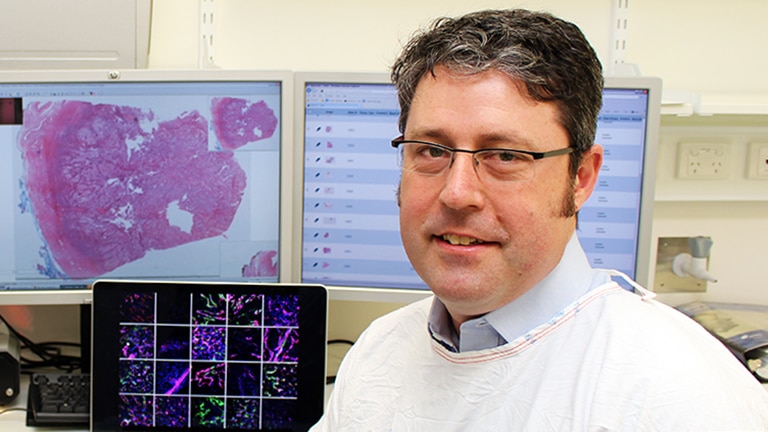
Hunter researcher Dr Craig Gedye has helped to map an atlas of the tumour microenvironment to better understand how the immune system is involved.

An in-depth atlas of the tumour microenvironment has been mapped by an international cancer team involving Hunter researcher Dr Craig Gedye, seeking to build a clearer picture of how the immune system is involved with cancer.
Using cutting-edge imaging technology called Mass Cytometry, the group aims to discover if immune cells within a cancer allow certain patients to have almost miraculous outcomes from new-generation immunotherapies.
Their hope is the mechanism can be replicated for those who currently gain no benefit from the same therapies – in fact, some people may have immune cells that protect tumours rather than fight the cancer.
“In melanoma, for example, we have an increasing number of patients where we can’t see their cancer on scans anymore after treatment,” Dr Gedye, a Calvary Mater Newcastle oncologist, says.
“We’re racing to find out what’s going on inside the tumours because cancers are different, immune systems are different, bacteria in the gut are different. We want all patients to have these extraordinary results with immunotherapy.”
He likens the new immune therapies to “Kung Fu” in that they teach the body’s self-defence system to recognise and attack cancer cells. But Dr Gedye also says researchers have more to learn about immune responses so they can minimise failures and build on successes.
Previous studies have employed laboratory models whereas Mass Cytometry has enabled human samples to be used. These samples were donated by patients and collected direct from pathology after surgery, with the cells still alive before being specially preserved.
As published in the leading international journal Cell, a number of immune system components – macrophages and T cells – were identified within the 3.5 million measured cells. The study focused on a common type of kidney cancer called a clear cell carcinoma, however Dr Gedye is confident it has implications for all cancers.
“It shows we can take a snapshot of a patient’s immune system. The hope is that this will increase the scope and potency of new immunotherapy medications, tailor appropriate therapies from the drugs we already have, and also get new ideas for treatments.
“With Mass Cytometry we can investigate five times as many variables as existing methods. In the first instance it showed dozens of different populations of different families immune cells inside tumours. We’ve known broadly that it was happening but now we can investigate it on a patient-by-patient basis.”
* Dr Craig Gedye is from the Calvary Mater Newcastle and University of Newcastle, researching in conjunction with HMRI’s Cancer Program and the Hunter Cancer Research Alliance.

HMRI would like to acknowledge the Traditional Custodians of the land on which we work and live, the Awabakal and Worimi peoples, and pay our respects to Elders past and present. We recognise and respect their cultural heritage and beliefs and their continued connection to their land.

Hunter Medical Research Institute
We’re taking healthy further.
Locked Bag 1000
New Lambton
NSW, Australia, 2305



This site is protected by reCAPTCHA and the Google Privacy Policy and Terms of Service apply.
Copyright © 2024 Hunter Medical Research Institute | ABN: 27 081 436 919
Site by Marlin Communications
